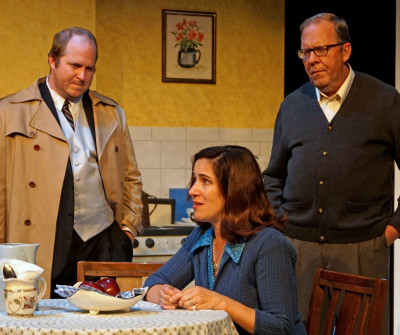REVIEW BY CARY GINELL
In their 1962 Cold War satire, “The John Birch Society,” the Chad Mitchell Trio sings, “You cannot trust your neighbor or even next of kin / If Mommy is a Commie then you gotta turn her in.” This suggests the dilemma faced by a suburban English family in Pack of Lies, Hugh Whitemore’s 1983 drama of deceit and betrayal, which closes this weekend at the Hillcrest Center for the Arts. Panic! Productions has assembled a first rate cast in presenting the tension-filled story concerning the members of the Jackson family, who reluctantly allow their home to be taken over as a stakeout by an investigator from Scotland Yard, who is suspicious of the activities of the Krogers, their best friends who live across the street.
The play, which is based on a true story, resembles that of a Hitchcock thriller, where innocuous, day-to-day activities mask a growing tension in the Jackson household, as the investigator reveals more and more about the Krogers and their suspected association with a nefarious KGB agent, who visits their home on a weekly basis. Whitemore’s skillful writing results in confusing the audience into being undecided as to who to side with: Stewart – the smug detective, or the affable, loving Krogers. In the end, the actual business of the espionage takes a back seat to the lies each character in the play is forced to engage in, which becomes the overpowering evil of the story.
The character who suffers the most from the ordeal is Barbara Jackson, who is close friends with Helen Kroger, a transplanted Canadian whose husband Peter works as a book dealer. As Barbara, Julie Fergus gives a powerful, nuanced performance, as her initial disbelief grows into mounting disgust, not at the traitorous deeds Helen is accused of engaging in, but of her own deception in not divulging her cooperation with the authorities to her friend. At various points in the play, characters periodically address the audience; Fergus’ monolog is particularly disquieting, as she recalls her first realization of Helen’s implication.
Robert Weibezahl plays Barbara’s husband, Bob, who, although also uncomfortable with turning his home over to the authorities, is more complacent about the whole thing, preferring to go along with the deception since it is the only thing to do. Weibezahl’s understated performance is one of his best ever as he meekly and helplessly cooperates, reasoning that it is his only choice.
As the Jacksons’ teenaged daughter Julie, Samantha Togno is excellent, especially in the penultimate scene, in which she is finally told that her beloved “Auntie Helen” is acting as a spy for the Soviet secret service; her shrieks of anguish at this realization are chilling and totally convincing.
The key character in the story is that of the detective, Stewart, played with great relish by Brian Robert Harris. Alternately jolly and sinister, Stewart keeps pertinent information from the Jacksons, initially describing himself as a “civil servant” and cagily evading pointed questions posed by the Jacksons about what he believes the Krogers have done. Harris utilizes a frozen, used-car salesman smile that becomes increasingly disturbing, especially to Barbara; eventually, his demeanor makes him the presumptive antagonist of the play, instead of the friendly, out-going Krogers. Harris’ performance is nothing short of extraordinary as he transforms what should be a heroic character into one of evil intentions, which has disrupted the genuine conviviality of the two families. His best moment comes when he talks about the head of the KGB, who he knows infinitely better than even his own next-door neighbor.
Kimberly Demmary is wonderful as Helen Kroger. For the play to work, Helen has to be as likable as Stewart is detestable. Her bubbly, brassy portrayal is infectious, and even we want to believe that all the suspicions aimed at her by Stewart are false. From Barbara’s point of view, the true tragedy of the story is her growing reservation about Helen’s true feelings about her. Was it all an act? Or did Helen truly like her, despite her diabolical associations?
Don McGreevy plays Peter Kroger, who mostly takes a back seat to his wife during the play, but has his own superb moment during an unsettling monolog to the audience, when he recalls a time during the Depression when the sight of seeing the misery endured by unemployed Americans convinces him to adopt the Communist agenda.
Sommer Branham and Tara McGrath round out the cast as Stewart’s subordinates, who are entrusted with the day-t0-day surveillance of the Krogers’ activities from Julie Jackson’s bedroom window. Both are excellent, especially Branham as the warm, engaging Thelma, who befriends Barbara Jackson during her turns at the window, yet is forced to remain at arm’s distance concerning the true nature of the case she is helping investigate.
The production is solidified by a marvelous set, designed and constructed with meticulous attention to detail by Jeffrey Calnitz, who also fashioned the subtle, effective lighting. Calnitz created an impeccable English home, circa 1960, accurately crafted right down to the furniture and the pattern on the tile flooring. Vivien Latham effectively coached the cast on their English accents while Natalie Katz provided the period costumes of the era.
Anyone old enough to remember the Cold War can recall the acute sense of suspicion that pervaded the Western world back then, an insidious, irrational fear that there was a Communist under every bed and that a wholesale attack on the free world was being plotted by a soulless “evil empire.” Pack of Lies poses the notion that subversive tendencies pale in comparison to the true evil, when distrust, deception, and betrayal were the cause of the most turmoil during those uncertain times.
*********************
Pack of Lies concludes this weekend at the Hillcrest Center for the Arts. See the VC On Stage Calendar for details.






No Comments